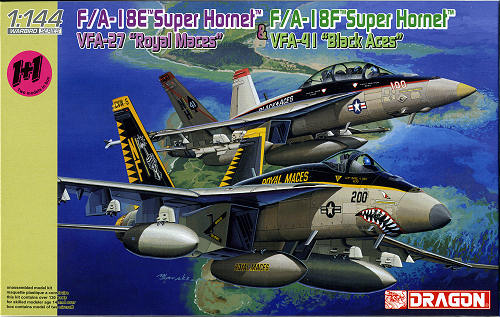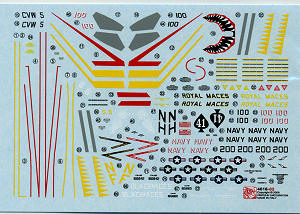
Dragon 1/144 F-18E/F Super Hornet
| PRICE: | $15.95 MSRP |
| DECALS: | Two options |
| REVIEWER: | Scott Van Aken |
| NOTES: | Two full kits |

| HISTORY |
The average life span of a modern aircraft in US military service is about 25-30 years; sometimes more if the airframe is extensively overhauled. Most modern tactical aircraft (and we are talking fast jets) have an airframe life of around 5,000 hours. Patrol and cargo aircraft are much, much more, but they don't have to deal with the sort of stresses that are routinely a part of the flight envelope of a fast jet.
This is particularly true of those aircraft that deploy on America's aircraft carriers, where they are flung into the air by powerful steam catapults and then snatched from flight by arresting cables. With the retirement of the F-14 Tomcat coming closer, it was realized that something was needed to replace it.
The F-18A-D Hornet was already in service and doing a fairly good job of things, despite being unable to meet the original goals of the design in terms of load carrying and range. It was postulated that a modified Hornet would be able to meet the needs of the Navy as a replacement for a variety of aircraft, like the A-6, F-14 and older Hornets and have commonality with the earlier versions of the F-18. Sounded great to the Navy planners and so they OK'd the design.
Well, as things turned out, many modifications had to be made to what was now referred to as the Super Hornet. The end result was a larger aircraft that has almost no commonality with the earlier version other than the designation. It also suffered from an inability to meet all its design goals, but as it was an improvement over the existing F-18A/C, and with nothing else on the horizon, the decision was made to go with it .
The resulting aircraft, which first flew in 1995, is now becoming fully integrated into the fleet. The first variant to see fleet service was the F-18E, the subject of this kit, an aircraft that started entering service in the late 1990s, initially replacing A-6, then earlier F-18A and with the F-18F model, F-14 Tomcats as those units retired their aircraft.
Those squadrons flying the single seat 'Super Bug' are primarily tasked with the fighter-bomber role, though it can also operate as a standard fighter, carrying the usual array of air to air weapons. It also incorporates as much 'stealthiness' as it can with the gear doors having serrated edges and other parts of the airframe (such as the intakes) designed to be less visible to radar. The two seat versions are primarily to be interceptors, but can do just about everything the single seat ones can do. Those few that have been used in combat (albeit against light defenses) have proven to work as advertised and more are due to be built until it, too will succumb to old age and be replaced by something else on down the line.
| THE KIT |
 Dragon has to be the leader in producing military aircraft in 1/144 scale. At least modern military aircraft, as their catalogue shows it has Hornets, Tomcats, Eagles, Harriers, and Falcons, to name a few. We can now add to it the F-18E Super Hornet and to provide a perception of value, Dragon has recently been putting two aircraft into their newest boxings. These generally retail around the $15 dollar range and might even be less expensive if the company had not buckled to the greedy lawyers at Boeing in terms of having to pay licensing fees on each kit.
Dragon has to be the leader in producing military aircraft in 1/144 scale. At least modern military aircraft, as their catalogue shows it has Hornets, Tomcats, Eagles, Harriers, and Falcons, to name a few. We can now add to it the F-18E Super Hornet and to provide a perception of value, Dragon has recently been putting two aircraft into their newest boxings. These generally retail around the $15 dollar range and might even be less expensive if the company had not buckled to the greedy lawyers at Boeing in terms of having to pay licensing fees on each kit.
Anyway, the sprues are quite nicely detailed with engraved panel lines which, while grossly out of scale as you'd expect, do provide what modelers want and look very nice once under a coat of paint. Naturally, the kits are designed to make conversion to the F-18F a snap by simply adding another upper fuselage insert for the longer cockpit section. The cockpit is pretty much devoid of panel detail, though you do get a believable bang seat, control stick, and instrument panel. As you might expect, the tub is for the two seat plane, but one simply puts a piece in there to cover it up.
The wings can be displayed with the tips folded if you want, and it is on these folded sections that I found the only molding glitch, a slight sink area near the hinge. There are a complete set of pylonsprovided though not all will be filled with available ordnance. There are drop tanks for the centerline and inboard wing stations. the tips have AMRAAMS , while there are a pair of Anti-Radiation Missiles for the outer pylons. Landing gear are well done for this scale and appear to be quite robust. This is topped by a clear one-piece canopy. In fact, aside from a single insert and the two piece canopy, there is no real difference in the F-18E/F kits.
, while there are a pair of Anti-Radiation Missiles for the outer pylons. Landing gear are well done for this scale and appear to be quite robust. This is topped by a clear one-piece canopy. In fact, aside from a single insert and the two piece canopy, there is no real difference in the F-18E/F kits.
Markings are for two CAG birds as shown on the box art. The ferocious shark mouth plane is the CAG bird from VFA-27 'Royal Maces' with the black fins and upper fuselage. The other is from VFA-41 'Black Aces', an ex-F-14 unit. It also has a black surround to the canopy area. On both these kits all the black bits will need to be painted. The decal sheet provides the trim stripes, but the craftsmanship is all yours. Decals are well printed and should provide no problems
| CONCLUSIONS |
These Dragon 1/144 aircraft kits are solid sellers and having two to work on is a real plus for most. If you have not tried one, you owe it to yourself to give one a go.
| REFERENCES |
February 2010
Thanks to www.dragonmodelsusa.com for the preview kit. Get yours today at your local shop or on-line retailer.
If you would like your product reviewed fairly and fairly quickly, please contact the editor or see other details in the